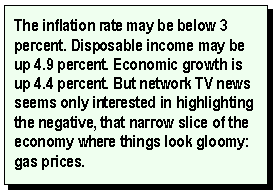 |
|||||||||
|
 |
||
|
 |
||||||||||||||||||||||||
|
||||||||||||||||||||||||
 |
||||||
|
||||||
 |
||||||
|
 |
||||||||||||||||||
|
||||||||||||||||||
 |
||||||||||||||||||||||||
|
||||||||||||||||||||||||
 |
||||||||||||||||||
|
||||||||||||||||||
|
|
|
For Immediate Release: Katie Wright (703) 683-5004 - Thursday, May 27, 2004

ABC, CBS, NBC Aired 50 Stories Playing Up "Skyrocketing" Gas Prices, 22 Falsely Said "Record High"
Why Are Gas Prices the Are prices rising to the point where Americans are suffering great financial hardship? The most current Consumer Price Index issued by the Department of Labor reported that prices rose 0.3 percent in April, and rose 2.3 percent since April 2003. But so far in May, the TV networks have found only one overwhelming story on the economy, the price of one single commodity: gas prices rising to "all-time highs." From May 1 to May 26, the morning and evening news shows on ABC, CBS, and NBC have aired 50 news stories or interviews on "skyrocketing" gas prices and their impact on the economy. (Twenty-three of those stories were brief anchor-read updates.) Of that sample, 22 stories inaccurately informed viewers of "record highs" in gas prices. CBS was the Hype Channel, with 15 of the 22 "record high" errors. While the average nominal gas price has risen above $2 a gallon, the networks routinely fail to adjust for inflation. In today's dollars, gas prices were at least 26 percent higher in March 1981 after the Carter-era inflation spiral. Gas prices today would have to reach $2.99 a gallon to be a record. The networks were all about stoking consumer anger. On ABC's Good Morning America May 19, reporter Jake Tapper warned: "Whoever's at fault, Americans are hurting. Fifty-four percent say recent gas prices are causing financial hardship; 31 percent report serious hardship, a dramatic increase from previous gas crises." Tapper went looking for consumers to get angry at the "crisis" on camera: • "I'm mad. Why is it so high? I don't understand." • "It stinks. I mean, I've never seen it this high." • "It makes you angry because it doesn't make sense for gas to go up that fast overnight." • "It's going to kill us. These prices are going to kill us, man." Reporters like Tapper are too eager to exploit the concept of "hardship" to explain that it's not so scary in personal terms. If you buy 15 gallons of gas a week and it costs 50 cents more per gallon than it did a few months ago, that's a cost increase of just $7.50, which is less than the price of a movie ticket.
But good economic news is not big network news. When the Labor Department reported on May 7 that the unemployment rate declined to 5.6 percent, with the creation of 288,000 new jobs, it was a one-day story. The other rare bursts of economic news were gloomy. On May 8, ABC's World News Tonight claimed it was "the worst job market for teenagers since World War II." This very narrow focus fails to present the American people with a balanced macroeconomic picture. With the positive news shoved to the side, it's no wonder that the latest ABC-Washington Post poll found that 54 percent disapproved of President Bush's handling of the economy. Voters who want to avoid a distorted take on the economic facts ought to turn the network news off.
Home | News Division
| Bozell Columns | CyberAlerts |







 The networks also leave out the fact that personal incomes are rising faster than the rate of inflation. The Commerce Department reported today that disposable income, adjusted for inflation, rose 4.9 percent in the first three months of the year, more than the 4.3 percent previously estimated. The government also reported that economic growth is up 4.4 percent in the third quarter, and up five percent in the last 12 months, the fastest growth rate since 1984.
The networks also leave out the fact that personal incomes are rising faster than the rate of inflation. The Commerce Department reported today that disposable income, adjusted for inflation, rose 4.9 percent in the first three months of the year, more than the 4.3 percent previously estimated. The government also reported that economic growth is up 4.4 percent in the third quarter, and up five percent in the last 12 months, the fastest growth rate since 1984.